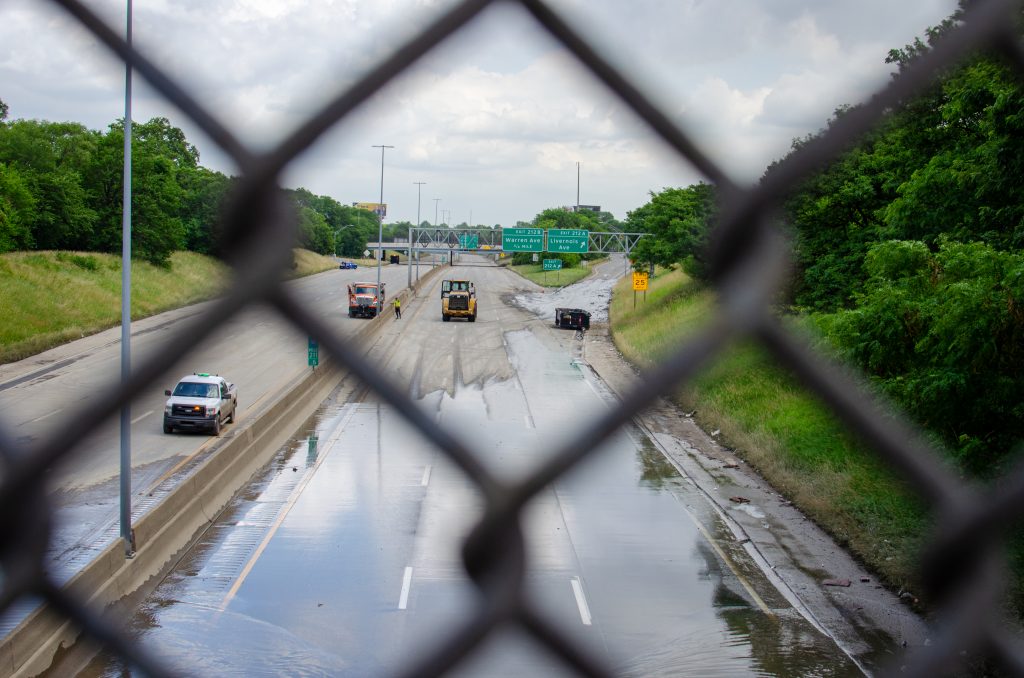Infrastructure Bill May Help Address Flooding in Michigan, But Only If There’s a Plan, Dingell Says
Rep. Debbie Dingell (D-Dearborn) says Michigan will be competing for water infrastructure with communities across the country, and we need to come up with a regional plan that answers questions on spending.

There’s hope in Michigan that any infrastructure package in Washington, D.C. might help address flooding problems in the state.
As part of the weekly series MichMash, hosts Jake Neher and Cheyna Roth talk about how the answer might depend on local public officials and whether they can find ways to work together.
Subscribe to MichMash on iTunes, Spotify, Google Podcasts, NPR One or wherever you get your podcasts.
This summer has brought some of the worst flooding in the state’s history, especially in Southeast Michigan.
Members of Congress say they are hearing lots of questions from constituents about what the infrastructure package might mean for our flooding problem.
“And people say to me, when the bill passes, will this take care of the problem? Well, it’s not going to take care of the problem if we don’t have a plan,” Rep. Debbie Dingell (D-Dearborn) recently told WDET’s Stephen Henderson on Detroit Today.
Dingell lives in and represents Dearborn, which has been ground zero for flooding in Michigan this summer. She says Michigan communities are going to be competing for this infrastructure money with communities across the country.
She notes that getting that money isn’t just about how bad the problem is where you are. It’s also about being able to answer lots of questions about what your plans are for the money and how it will be spent, which is why Dingell says we’ve got to come up with a regional plan — and one that answers all of those questions.
“We have to have a regional plan,” she says. “We have to be ready. We have to keep this work going. And it can’t keep happening. I just have held people sobbing in my arms whose life has been wiped out in some ways for them, and it keeps just happening. We’ve got to work together and get plans done to address this so that it doesn’t keep happening every time it rains.”
“And people say to me, when the bill passes, will this take care of the problem? Well, it’s not going to take care of the problem if we don’t have a plan.” –Rep. Debbie Dingell (D-Dearborn)
Dingell along with the entire Michigan Congressional delegation — Democrats and Republicans — are supporting the Michigan Department of Transportation’s request for $50 million in resiliency funds from the Federal Highway Administration to strengthen pump station generators and other flood prevention infrastructure.
But that’s just a drop in the bucket of the cost of all the changes that would need to be made in the long term.
Before she resigned late last month, former Great Lakes Water Authority CEO Sue McCormick said separating the sewerage and stormwater systems in Metro Detroit alone could cost up to $17 billion and $8 billion for the city of Detroit alone. That might not end up being the most cost-effective or practical solution to flooding, but it illustrates just how big and expensive the infrastructure side of these issues can be.
Some environmentalists and urban planners also note that none of that addresses the ways our built environment contributes to the problem. They note that we’ve put a lot of concrete up everywhere we live, including over wetlands and other ecosystems that used to help absorb all that rainwater. As climate change continues to advance, they say it’s time to start having more conversations about how we might rethink the ways our entire communities are designed and built.
More from MichMash:
Michigan’s Petition Initiative Process Is A Mess
Pandemic Has Hurt Government Transparency, Reporters and Watchdogs Say
Future of Line 5 Uncertain After Enbridge Ignores Whitmer’s Order to Shut Down
To Fix Labor Shortage, the Service Industry Needs to Start Humanizing Workers, Restaurant Owner Says
Trusted, accurate, up-to-date.
WDET strives to make our journalism accessible to everyone. As a public media institution, we maintain our journalistic integrity through independent support from readers like you. If you value WDET as your source of news, music and conversation, please make a gift today.
